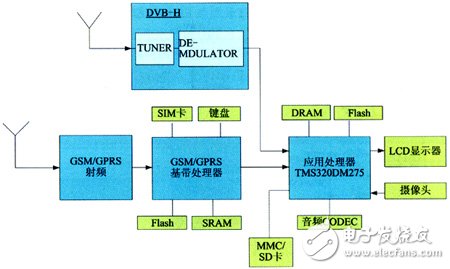There are three types of mobile TVs, one based on analog TV broadcasting networks, the other based on mobile communication networks, and one based on digital broadcasting networks. The first solution is to add an analog TV module to the mobile phone to receive the analog TV broadcast program, which is not easy to be accepted by the consumer because the effect is not satisfactory. The scheme based on the mobile communication network is further divided into a unicast scheme based on a 2.5G mobile communication network and a multicast scheme based on a 3G mobile communication network. The unicast solution uses the 3GPP standard video format to provide on-demand, live broadcast, and carousel services through streaming media servers, such as China Mobile and China Unicom's WAP portal. The multicast scheme, such as MediaFLO of Qualcomm, USA, calculates the load of the mobile network, performs reasonable network scheduling, and controls the playing time and program transmission mode of the media program. Mobile TV based on digital TV broadcasting network has three major standards: DVB-H (Digital Video Broadcas TIng-Handheld) in Europe, ISDB-T (Integrated Services Digital Broadcas TIng-Terrestrial) in Japan, and T-DMB (Terrestrial-Digital MulTImedia in Korea) BroadcasTIng). China's national standards have not yet been formally promulgated. At present, T-DMB has been opened in South Korea and has more than 300,000 users. T-DMB experimental networks are already under construction in Beijing, Guangdong and Shanghai. DVB-H is also operating in several European countries. This article discusses the mobile TV solution based on digital TV broadcasting network mobile TV, TI's DM275, HOLLYWOOD DTV1OOx and TSC2110 mobile phone platform, this program is in the process of development. Mobile digital TV mobile phone design The mobile digital TV handset consists of two subsystems: the DVB-H mobile digital TV subsystem and the GSM/GPRS communication subsystem, as shown in Figure 1. The two subsystems are hosted on the application processor and control the DVB-H mobile digital TV receiver and GSM/GPRS communication module. Figure 1 Mobile digital TV handset block diagram Mobile digital television subsystem The mobile digital television system consists of a mobile digital TV receiver including a tuner, a demodulator, and an application processor, as shown in FIG. Figure 2 Functional block diagram of the digital TV module The input to the mobile digital television receiver is a radio frequency broadcast signal from the antenna whose output is an MPEG-2 Transport Stream (TS) or IP data packet. They are then input to the application processor for decompression of video and audio and displayed on the LCD. Data communication between the mobile digital TV receiver and the application processor (TI DM275) is divided into two categories: (1) control and state exchange. The application processor downloads and configures the receiver startup program; the receiver reports the operation information and status of the application processor. (2) Data flow. The channel signal to be decoded is transmitted, including digital video, digital voice and data that are delivered from the receiver to the application processor. The above two types of data are transmitted on one physical interface or two physical interfaces. There are three physical interface modes, as listed in Table 1. Table 1 Physical interface mode The SDIO interface mode of the receiver and the application processor is discussed below, as shown in Figure 3. Figure 3 Receiver with 4-bit data line SDIO interface In SDIO interface mode, control and status reports and data streams are exchanged via SDIO and are divided into 4-bit and 1-bit data interface modes, as listed in Table 2. Table 2 SDIO interface mode The integrated DSP core on the DM275 is the TMS320C54x and the CPU core is the ARM7TDMI. The DM275 is a portable terminal DSP that supports H.264/MPEG-4 AVC (hereafter referred to as H.264) codec processing, and is characterized by integrating a dedicated circuit responsible for MPEG-2 transport stream separation processing. The DM275 is a successor to TI's TMS320DM270. It contains a 102MHz TMS320C54x DSP processor and a dual-core architecture of 88MHz ARM7TDMI microcontroller. A processing circuit for separating the MPEG-2 transport stream is added, and the dedicated circuit iMX responsible for the partial image data decoding process also supports the H.264 decoding process. The codec processing capability of the DM275 is as follows: (1) Encoding processing. MPEG-4 Simple Profile: 640 × 480 pixels, 30 frames / s; MPEG-4 Advanced Simple Profile: 320 × 480 pixels, 30 frames / s. (2) Decoding processing. H.264: 352 × 288 pixels, 30 frames / s; MPEG-4 Advanced Simple Profile: 720 × 480 pixels, 30 frames / s; MPEG-2: 720 × 480 pixels, 30 frames / s; DivX: 720 × 480 Pixels, 30 frames/s; WMV (Windows Media Video) 9: 720 x 480 pixels, 30 frames/s. The DM275 has a variety of external interfaces: USB, UART, MMC/SD, SPI, SDRAM, LCD. Can be directly with CCD or CMOS camera. Due to the flexible programming features and strong signal processing capabilities of the DM275, it can adapt to the needs of various mobile TV standards and is suitable for mobile TV multimedia mobile phone applications. Power Inverter,Sine Wave Solar Power Converter,Pure Sine Wave Solar Inverter,Pure Sine Wave Power Inverter Zhejiang Kaimin Electric Co., Ltd. , https://www.ckmineinverter.com



